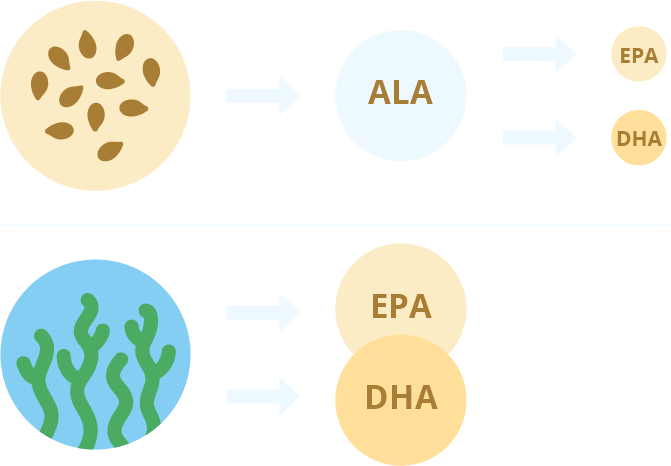Table of Contents
If you've looked into dietary supplements to boost your health, fish oil probably came up a lot. It's known for its omega-3 fatty acids, which are good for your heart, brain, and more.*
But what if you follow a plant-based diet like veganism or vegetarianism? You might wonder: what's a good vegan alternative to fish oil?
One answer is flaxseed oil. It's plant-based, packed with omega-3 fatty acids, and a great fish oil alternative for vegetarians. Another option is algae oil, which is also gaining popularity.
Both flaxseed oil and algae oil are nutritious and can replace fish oil for vegans and vegetarians. But how do vegan flaxseed and algae oil compare when it comes to improving your diet and getting more omega-3s?
What Is Flaxseed Oil?

Flaxseeds, alternatively known as linseeds, boast a rich history as one of the ancient crops revered for their multifaceted utility. Beyond their application in textiles, flaxseeds have been cherished for their nutrient-dense profile. In a testament to their nutritional value, King Charlemagne, in the 8th century, mandated his subjects to incorporate flaxseeds into their diet. Fast forward to today, they've earned the "functional food" badge thanks to their robust nutritional composition.
There's a spectrum of ways to harness the health benefits of flax. Ground flaxseed, easily prepared with a blender or food processor, melds seamlessly into cereals, smoothies, and baked delights. On the other hand, flaxseed oil, a product of cold-pressed mature flaxseeds, presents a versatile option for cooking and baking, akin to other vegetable oils. Moreover, vegan flaxseed oil capsules are readily available for those on a quest for a convenient supplement.
Whether you opt for the oil or capsules, flaxseed oil emerges as a plant-based conduit to enrich your diet with essential nutrients.
What Are The Benefits Of Flaxseed Oil?

Flaxseed, in any form, is a prized addition to any health-conscious diet owing to its rich reservoir of essential nutrients, including proteins, dietary fiber, and potent antioxidants known as lignans. Yet, its crowning glory is the abundance of omega-3 fatty acids, making it a cherished plant-based source of Omega-3.
Omega-3 fatty acids are synonymous with an array of health benefits that many individuals strive to attain in their quest for improved health and longevity. These beneficial fats are revered for their potential in curbing inflammatory reactions in the body, fortifying heart health, fostering healthy brain development, alleviating mood disorders, nurturing radiant skin and hair, and strengthening bones and muscles.*
Typically, oily cold-water fish such as salmon, tuna, and mackerel are touted as the go-to sources of omega-3s. Fish oil supplements often bridge the gap for those whose diets fall short in fish intake. However, fish oil pivots away from the dietary preferences of vegans, vegetarians, and those keen on reducing animal product consumption, rendering them susceptible to omega-3 deficiencies.
This is where the allure of vegan flaxseed oil shines through. Vegan flaxseed capsules have carved a niche among health aficionados as a robust omega-3 fatty acid alpha-linolenic acid (ALA) source. With a composition boasting about 55% ALA, flaxseeds stand tall as the richest plant-derived source of this omega-3.
Vegan flaxseed capsules embody a simplistic, convenient, and potent avenue to harness flaxseed’s omega-3 bounty. Research underscores the health dividends linked to flaxseed and flaxseed oil, spotlighting their potential in:

- Reducing risks of heart disease*
- Helping manage high cholesterol levels and high blood pressure*
- Reducing arthritis symptoms*
The plant-based pedigree of flaxseeds and flaxseed oil is a boon for vegetarians, vegans, individuals with seafood allergies, or those averse to the characteristic fishy aftertaste of fish oil capsules. The eco-conscious also find solace in flaxseed oil as a sustainable alternative, removing the environmental risks associated with fish oil production like overfishing and marine ecosystem degradation.
Opting for flaxseed over fish oil also builds a buffer against potential exposure to heavy metals such as mercury, often found in seafood. This is a significant consideration given the toxicity risk posed by mercury accumulation.
Flaxseed Oil vs. Algae Oil

For vegans on the quest for plant-based omega-3 fatty acid sources, both flaxseed oil and algae oil emerge as potent contenders. Although they share the common ground of being vegan-friendly and environmentally sustainable compared to fish oil, they differ in the type of omega-3 fatty acids they offer.
Flaxseed oil is rich in alpha-linolenic acid (ALA), a form of omega-3 fatty acid primarily found in plants. Besides flaxseeds, ALA also graces other plant foods like walnuts, chia seeds, and kale with its presence.
Conversely, algae oil is a treasure trove of eicosapentaenoic acid (EPA) and docosahexaenoic acid (DHA), the duo of omega-3 fatty acids typically found in fatty, oily fish. The genesis of these omega-3 fatty acids traces back to microalgae, which produce EPA and DHA through photosynthesis. These fatty acids are then transferred to the fish that consume the microalgae, and eventually to humans who eat the fish.
The captivating part? The algae oil bypasses the fish and brings the EPA and DHA directly from the microalgae to you, making it a stellar plant-based source of these vital omega-3 fatty acids.
Why Flaxseeds Aren’t A Comparable Substitute To Algae Oil

Both flaxseed oil and algae oil hold a badge of honor for their omega-3 fatty acid content. Yet, when eyeing the most bang for your omega-3 buck to boost health, algae oil races ahead.
Flaxseeds are rich in alpha-linolenic acid (ALA), a type of omega-3 fatty acid. But here’s the hitch: ALA isn’t bioactive on its own. It needs a transformation within your body into docosahexaenoic acid (DHA) and eicosapentaenoic acid (EPA), the star omega-3s that deliver the health benefits you’re after.
However, this conversion isn’t a smooth ride. Only about 5-10% of ALA converts into EPA, and a meager 2-5% becomes DHA. Simply relying solely on ALA for omega-3 benefits might leave you shortchanged.
Here’s where algae oil steals the spotlight. It comes loaded with DHA and EPA, offering a direct ticket to omega-3 goodness, bypassing the inefficient ALA conversion. Unlike other plant sources like flax, chia seeds, and hemp seeds that only offer ALA, microalgae is a unique plant-based haven for DHA and EPA.
This unveils a world of opportunity for vegans, vegetarians, or anyone seeking a robust source of omega-3s without straying from dietary boundaries or piling on heaps of ALA sources.
So, while flaxseed and microalgae oil outshine fish oil pills in health and sustainability realms, they aren’t on an even keel. Microalgae oil delivers EPA and DHA directly, cutting through the chase, while flaxseed oil only offers a stepping stone to the real omega-3 deal. Taking an algae oil supplement could be a more straightforward and efficient route to harness the omega-3s DHA and EPA, making them potentially more effective in scoring health wins.
Before diving into any omega-3 supplement regimen, a chat with your doctor can guide you toward the right type and dose that suits your health.


